Haile Gebrselassie: Kenyans made me the star I am today
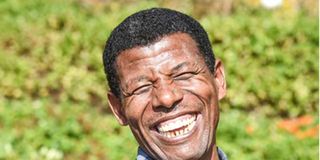
Ethiopia legendary athlete Haile Gebrselassie is tickled during an interview at Kerio View Hotel in Iten, Elgeyo Marakwet County on March 03, 2023.
What you need to know:
- The Ethiopian denied Tergat — currently president of the National Olympic Committee of Kenya — an Olympic gold medal twice (in 1996 in Atlanta and in 2000 in Sydney).
- Gebrselassie also beat Tergat to two World Championships titles (in 1997 in Athens and in 1999 in Sevilla) all in the 10,000 metres race.
Over the years, the battle in middle and long distance races has predominantly been the preserve of Kenyan and Ethiopian athletes.
The most recent showdown between the two neighbours was in the senior women’s race at the World Cross Country Championship held in Bathurst, Australia, last month.
Kenya’s Beatrice Chebet appeared headed for silver as world 10,000 metres record holder Letesenbet Gidey of Ethiopia had built a healthy lead in front on the Mount Panorama course.
But Chebet cruised past Gidey after the Ethiopian’s feet turned into jelly a few metres to the finish line to win the race.
Such dramatic Kenya vs Ethiopia battles have been the hallmark of international competitions over the years, with successive generations of athletes from the two nations religiously following in the footsteps of their predecessors.
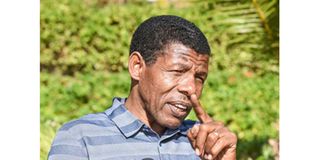
Ethiopia legendary athlete Haile Gebrselassie during an interview at Kerio View Hotel in Iten, Elgeyo Marakwet County on March 03, 2023.
Ethiopian legend Haile Gebrselassie was very much part of this duel in the late 90s and early 2000s.
“Kenyans used to give me a headache and I thank them for that. Without them, do you think Haile would be here talking to Kenyan media?" the superstar told us in an exclusive interview in Iten where we caught up with him recently.
Gebrselassie, who was on his second trip to Iten on an Adidas promotion, confessed that he felt at home whenever he visited the Kenyan Rift Valley. “I woke up in the morning and walked up the road and saw hundreds of athletes running up and down. It was really amazing and I felt like I was in my home town,” he said.
“Most of them recognise me, but the problem is I can't recognise most of them since they are young and some were not yet even born during my prime years,” he added, with his ubiquitous smile. The Ethiopian multiple world record holder draws parallels in training patterns between Kenya and Ethiopia.
“You think there would be Kenya without Ethiopia? Or vice versa?”
Gebrselassie, as expected, picks Kenyan legend Paul Tergat, a five-time world cross country champion, as the biggest nemesis in his stellar career. “My favorite competitor was Paul Tergat,” he says, laughing.
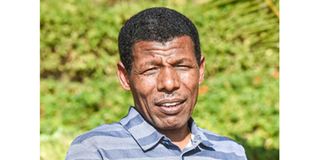
Ethiopia legendary athlete Haile Gebrselassie during an interview at Kerio View Hotel in Iten, Elgeyo Marakwet County on March 03, 2023.
The Ethiopian denied Tergat — currently president of the National Olympic Committee of Kenya — an Olympic gold medal twice (in 1996 in Atlanta and in 2000 in Sydney).
Gebrselassie also beat Tergat to two World Championships titles (in 1997 in Athens and in 1999 in Sevilla) all in the 10,000 metres race.
However, it was the 2000 Sydney Olympics final that still intrigues the now successful businessman.
“That race between Paul and I is one you will watch time and again. Personally, since 2000 up to now, I think I have watched it more than one thousand times, sometimes I even watch in twice a day,” he reflects.
In that highly anticipated race, Tergat, who seemed to have learnt from previous mistakes in his encounters with the Ethiopian, appeared to have forged a perfect plan to finally beat Gebrselassie.
He calmly stalked the Ethiopian and compatriot Patrick Ivuti for the better part of the race.
With 200 metres to the finish line, Tergat zoomed past his competitors and at 50 metres to the end, it looked as if he was finally bringing it home.
However, the relentless Ethiopian gave him a chase, crossing the finishing line inches ahead of Tergat.
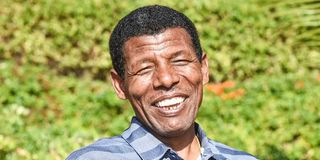
Ethiopia legendary athlete Haile Gebrselassie during an interview at Kerio View Hotel in Iten, Elgeyo Marakwet County on March 03, 2023.
“Believe it or not, that was not the performance of Haile, if you ask me. I think I was just lucky that day.
“Tergat deserved to win. He had done everything to emerge victorious… I wished there were two gold medals, but, unfortunately, there is only one. My friend Paul, if we happen to compete again, this time I'll give you a chance,” he adds bursting into laughter.
As our interview continued, it occurred that Tergat may not have only paid for his sins, but those of his compatriot, Daniel Komen also.
Haile was on a revenge mission after an embarrassing defeat he suffered at the hands of multiple world record holder Komen in 1996.
Fresh from winning an Olympic Gold medal in Atlanta, newly wedded Gebrselassie tagged his spouse Alem to the Weltklasse meeting in Zurich.
His aim was to impress the Queen of his heart by showing her first-hand how he does his thing on the track.
But unbeknownst to him, Komen, like an injured tiger, bitter for failing to feature at the Atlanta Olympics, had sworn to himself to prove to the whole world that he was the best middle and long distance runner at the time, and what a better way to do it than to beat a fresh Olympic champion!
Worst day of my life
With five laps to go, it was evident that Gebrselassie could not keep up with Komen's breathtaking pace, and the Kenyan went ahead to win the race in 12 minutes and 45.09 seconds, missing Gebrselassie's world record (12:44:39) by a whisker.
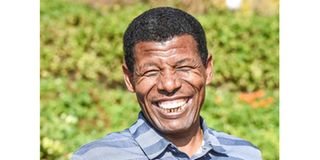
Ethiopia legendary athlete Haile Gebrselassie is tickled during an interview at Kerio View Hotel in Iten, Elgeyo Marakwet County on March 03, 2023.
“That was the worst day of my life. Komen beat me in front of my wife whom I had travelled with to Zurich with the same evening after our wedding and three days to the competition.
“It took me a year to get revenge and regain my dignity," he recalls with a grin.
At the same meeting in Zurich a year later, Gebrselassie beat Komen, lowering his own world record in the process by clocking 12:41.86.
However, his “sweet” win was short-lived as it took Komen only nine days to break the Ethiopian's new world record when he clocked 12:39.74 in Brussels.
Gebrselassie had another dramatic encounter with a Kenyan athlete at the 1993 Stuttgart World Championships.
Moses Tanui was seeking to defend his 10,000m title as Gebrselassie, who had just graduated to the senior level, seeking to register his presence.
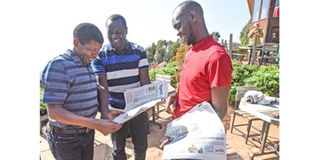
Ethiopia’s legendary athlete Haile Gebrselassie (left) and Nation Media Group Sports Desk journalists Bernard Rotich (centre) and Steve Keter go through the Daily Nation sports coverage at the Kerio View Hotel in Iten, Elgeyo Marakwet County on March 3, 2023.
As the race picked up, Tanui and Gebrselassie were in the leading pack and just for a few metres to the bell, the Ethiopian stepped on Tanui's shoe, causing the Kenyan to lose the shoe and his rhythm in the process, running with one shoe for the rest of the race.
Gebrselassie went on to win his first senior world gold. Tanui was visibly angry with the Ethiopian and even refused to shake his hand after the race. But the two have since buried the hatchet.
“Moses was in Addis Ababa the other day and we always joke. I told him ‘next time when we compete, make sure you tie your shoes properly, and I promise I won't touch you,’” giggled the Ethiopian.
Tanui, a two-time Boston Marathon champion, is currently the Director of the Eldoret City Marathon while Gebrselassie runs the Great Ethiopian Run.
The two meet from time to time to compare notes.
It is worth noting that from 1993, Gebrselassie won back-to-back World Championships 10,000m titles until 2001 in Edmonton when a Kenyan, Charles Kamathi, ended the Ethiopian’s winning streak of five consecutive world titles.
Sometimes the comparisons pit athletes of different generations against each other, and in this scenario, Kenyan and Ethiopian fans seek the bragging rights.
The question of "who is the greatest marathon athlete of all times?" will always unleash endless banter.
Ethiopians would argue that two-time Olympic marathon champion, the late Abebe Bikila, who won his first Olympic marathon title in 1960 running barefoot, is the best marathoner ever.
On the other hand, Kenyans maintain that Eliud Kipchoge, also a two-time Olympic marathon champion, a world record holder and the first man to run the entire 42kilometres in under two hours, as the greatest marathon runner to have ever graced the roads.
Gebrselassie has, however, warned that the Kenya-Ethiopia dominance might soon come to an end if deliberate effort will not be employed to save the two countries’ rich running heritage.
“Uganda is coming up and there is no question about that. They are our neighbours and we share the same genes.
“But other European and Asian countries are coming up as well, and we need to update our training style in order to cement our dominance.
“Other countries have their own sporting events that are embedded in their culture like football, basketball, tennis, cricket among others. Our sport is athletics and we must protect it,” he added.




